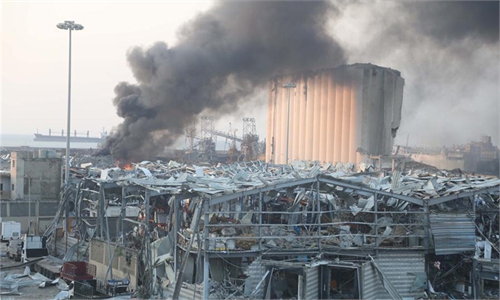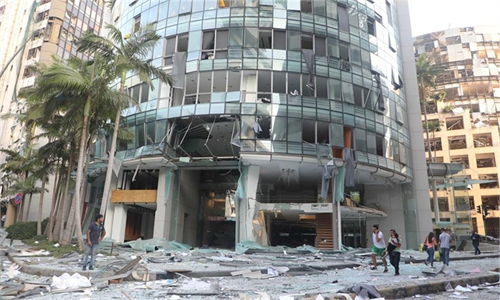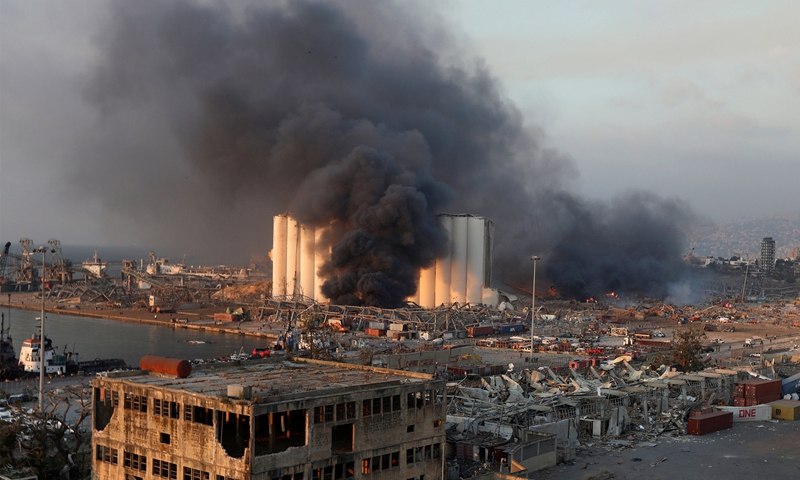
Smoke rises from an explosion site at the port of Beirut, Lebanon, Aug. 4, 2020. Photo: VCG
One Chinese was slightly injured and no Chinese was killed in the explosion in Beirut, capital of Lebanon, on Tuesday, the Chinese embassy in Lebanon told media.
The explosion has killed more than 100 and injured more than 4,000 as of Wednesday morning Beijing Time, according to the Xinhua News Agency.
Some people may have been slightly hurt by the glass shards caused by the explosion, but most Chinese citizens are safe, The Beijing News reported Wednesday, citing an anonymous employee from the Chinese embassy in Lebanon.
The embassy issued an urgent safety warning on Wednesday to Chinese citizens in Lebanon.
According to the warning, the explosion happened on Tuesday, leading to massive casualties and damaging many buildings.
An investigation into the explosion is underway, the embassy said.
China is deeply shocked and saddened by the explosions in Lebanon. We express our deep condolences to the victims and sincere wishes to their families and the injured. China would like to offer help to Lebanon to properly handle the incident and realize national development, Chinese Foreign Ministry Spokesperson Wang Wenbin said at a press conference on Wednesday.
The blast in Beirut damaged a warship of the UN Interim Force, and Chinese UN peacekeepers immediately organized officers and soldiers to assess the loss and materials to ensure they can be dispatched immediately after receiving rescue orders, the People's Daily reported.
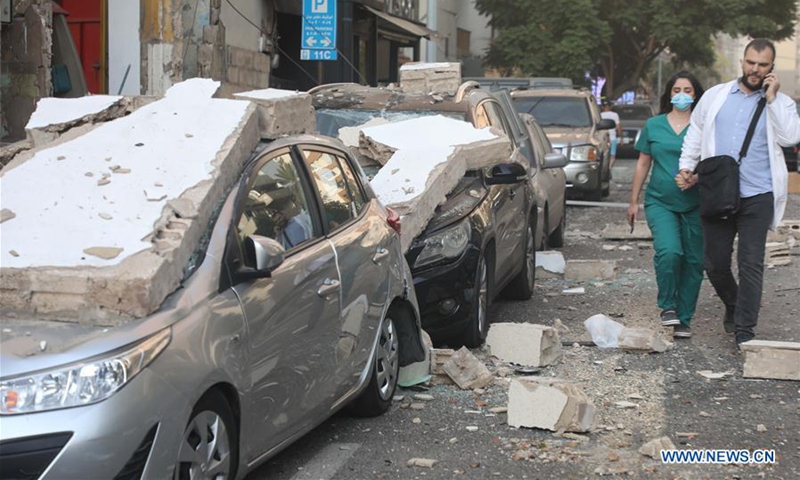
People walk past damaged vehicles after the explosion in Beirut, Lebanon, Aug. 4, 2020. The two huge explosions that rocked Lebanon's capital Beirut on Tuesday left dozens dead and injured, al-Jadeed TV channel reported. (Xinhua/Bilal Jawich)
Wang Yingjie, secretary-general of the Pinglan Public Welfare Fund, told the Global Times on Wednesday that the fund's office in Beirut suffered damage from the explosion.
"The blast shattered the glass of our office. Luckily, no one was injured. We plan to temporarily evacuate to nearby towns to prevent toxic gas and other injuries. Once we guarantee safety, we will start rescue work," Wang said.
The fund established an office in Beirut in May 2019 providing humanitarian assistance to Syrian refugees in and around the region.
Wang said the blast has so far not had a huge influence on the fund or local Chinese nationals, as many of them had returned to China due to the coronavirus pandemic. However, he was worried the incident could lead to social turmoil as the country is under huge economic pressure.
According to Wang, local Chinese nationals are mostly engaged in international trade, daily supplies and tourism businesses. Some of them are Chinese students while others run Chinese food restaurants. The fund will provide as much assistance to the victims of the explosion as possible.
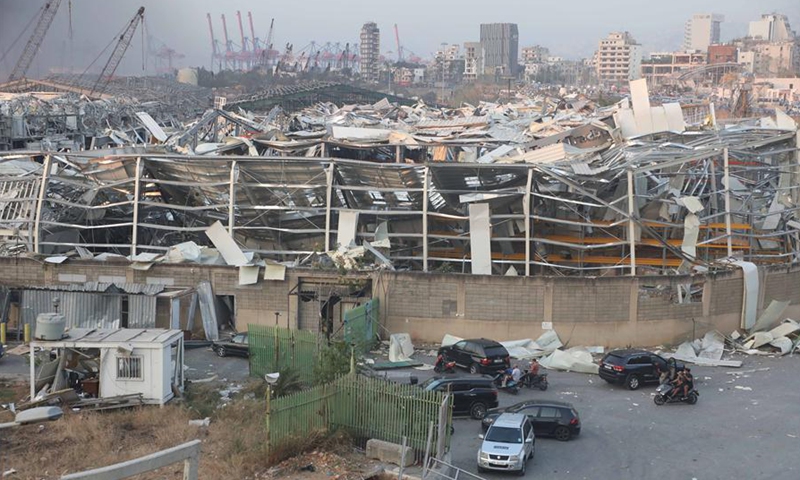
Damaged buildings are seen after the explosion at the port of Beirut, Lebanon, Aug. 4, 2020. The two huge explosions that rocked Lebanon's capital Beirut on Tuesday left dozens dead and injured, al-Jadeed TV channel reported. (Xinhua/Bilal Jawich)
The explosion was likely caused by 2,700 tons of ammonium nitrate stored in a local warehouse since 2014, according to media reports.
Lebanon's Prime Minister Hassan Diab declared Wednesday a national day of mourning.
At least 10 firefighters working for Beirut municipality are missing after the explosion, the city's governor Marwan Abboud told media, noting that the explosion reminded him of the nuclear bombs that were dropped in Hiroshima and Nagasaki.
Beirut is an important port in Lebanon and a feeder port in the Mediterranean region. It used to be a vital node in the journey from the Far East to Europe, but the port developed slowly and its operations have been greatly impacted by continuous domestic war, Wu Minghua, a Shanghai-based independent shipping industry analyst, told the Global Times on Wednesday.
Wu predicted that the explosion will lead to more ships turning to other ports along the Mediterranean rather than the Beirut port in the second half of this year, which will affect the port's business.
But it is unlikely that global trade will suffer from the explosion, due to the small weight and scale of trade at the Beirut port in the European and Mediterranean regions, Wu said.
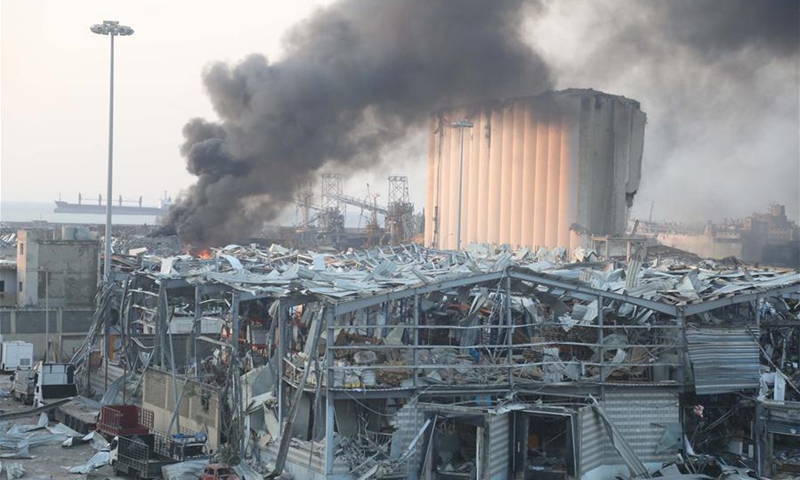
Smoke rises from an explosion site at the port of Beirut, Lebanon, Aug. 4, 2020. The two huge explosions that rocked Lebanon's capital Beirut on Tuesday left dozens dead and injured, al-Jadeed TV channel reported. (Xinhua/Bilal Jawich)

